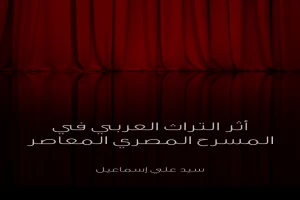Newly released
This book is new and will be uploaded as soon as it becomes available to us and if we secure the necessary publishing rights.

أثر التراث العربي في المسرح المصري المعاصر Book PDF
(0)
Author:
Sayed Ali IsmailNumber Of Reads:
30
Language:
Arabic
Category:
literatureSection:
Pages:
312
Quality:
good
Views:
779
Quate
Review
Save
Share
New
Book Description
«التُّراثُ» مَصدرُ إِلْهامِ الشُّعوب، ومُحرِّكُ وِجْدانِها، وصائِغُ مُستقبَلِها إنْ تمكَّنَتْ مِن الاسْتِفادةِ مِنهُ بصُورةٍ صَحِيحة؛ لِذَا تَمَّ تَوظِيفُه فِي أَحدِ أَكثرِ الفُنونِ تَأثِيرًا في المُجتمَع؛ وهُو «المَسرَح».
مَا مِن أُمةٍ إلَّا وتَفتخِرُ بتُراثِها، وتَسعَى لتَوظِيفِه في كُلِّ مَناحِي الحَياة؛ لِتَستفِيدَ مِنه وتُسبِغَ على ثَقافتِها عُنصرَ الأَصالَة. مِن هَذا المُنطلَقِ جاءَ دَورُ التُّراثِ العَربيِّ في المَسرحِ المِصريِّ المُعاصِر، وإنِ اختلَفَ الدَّورُ الذي يُؤدِّيه التُّراثُ في كُلِّ مَسرَحيةٍ حَسْبَما وظَّفَه الكاتِب؛ فالبَعضُ جعَلَه انْعِكاسًا لِذاتِه فعبَّرَ بِه عَن تَطلُّعاتِه وآمالِه، والبَعضُ استَخدَمَه ليُعبِّرَ عَنِ الأَوضاعِ الاجْتِماعيةِ والثَّقافِيةِ في عَصرِه. وكانَ للتُّراثِ دَورٌ مِحْوريٌّ في مَسْرَحةِ عَددٍ مِنَ القَضايا الاجْتِماعيةِ التي أرَّقَتِ المُجتمَع، وبالطَّبعِ حصَلَ التُّراثُ السِّياسِيُّ عَلى نَصِيبِ الأَسدِ في تِلكَ المَسرَحياتِ مُمثِّلًا مُختلِفَ الآرَاء؛ المُؤيِّدَ مِنها للسُّلطةِ والناقِمَ علَيْها، كَما عالَجَ المَسرَحُ عَلى اسْتِحياءٍ عَددًا مِنَ القَضايا الدِّينية، مِثلَ قَضِيةِ «الحَلَّاج»، واهْتمَّ مُؤلِّفو المَسرَحياتِ بالتُّراثِ الشَّعْبيِّ ﮐ «مَجنُون لَيْلى» وغَيرِها. إنَّ هذِهِ الدِّراسةَ تَكشِفُ القِناعَ عمَّا حمَلَه المَسرَحُ مِن دَلالاتٍ ومَعانٍ تُراثِيةٍ قَلَّما استطَعْنا قِراءتَها ممَّا بَينَ السُّطور.
Sayed Ali Ismail
Sayed Ali Ismail: An Egyptian writer specializing in theatrical literature and professor of Arabic language at the Faculty of Arts, Helwan University. He has published several contributions on theater and its history; This made him one of the most important contemporary writers who took an interest in theater as one of the most important modern arts.
Syed Ali Ismail Ali was born in Cairo in 1962, and obtained a BA in Arabic from the Faculty of Arts, Ain Shams University, then a master’s degree on the topic: “The Role of Women in Tawfiq Al-Hakim Theater” and a PhD on the topic: “The Impact of Arab Heritage on Contemporary Egyptian Theatre.” He joined the academic corps to teach literature in Egyptian universities, until he reached the position of head of the literary studies department at the Faculty of Dar Al Uloom, Minya University, and was assigned to the National Center for Theater and several Arab universities.
Ismail specialized in modern Arabic literature, especially in the theater branch, and began publishing his books dealing with Arab theater starting in 1996 AD, to continue writing extensively between printed scientific books, critical and documentary books, and separate articles that deal with all aspects of theater in successive periods of time. Since its inception, passing through the pioneering theatrical generations until the modern era, in addition to the theaters that influenced and influenced the Arab theater. Ismail was particularly interested in singling out books on forgotten topics from the memory of Arab theater, which many authors and theater critics did not elaborate on. In his research, he dealt with theater in the nineteenth century, and dusted off rare theatrical texts that were difficult for researchers and theater lovers to access.
Dr. Sayed Ali Ismail’s solutions are also repeated, a prominent member of many theatrical jury committees and graduate studies, and in an official capacity in Arab theater festivals, and committees for the development of academic education, a guest in many television and radio cultural and literary programs, and a lecturer in training courses and educational seminars at book fairs and centers He has received many honorary shields and certificates of appreciation from Arab cultural and academic institutions.
In his writings, he combines the uses of scientific methods in analysis, monitoring and scrutiny, in addition to a simplified method in order for the reader to access information easily and conveniently. He also believes in teamwork as a method of teaching literature, and is keen to use modern means in education.
Read More
Book Currently Unavailable
This book is currently unavailable for publication. We obtained it under a Creative Commons license, but the author or publisher has not granted permission to publish it.
Rate Now
5 Stars
4 Stars
3 Stars
2 Stars
1 Stars
أثر التراث العربي في المسرح المصري المعاصر Quotes
Top Rated
Latest
Quate
Be the first to leave a quote and earn 10 points
instead of 3
Comments
Be the first to leave a comment and earn 5 points
instead of 3